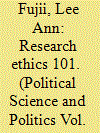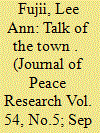|
|
|
Sort Order |
|
|
|
Items / Page
|
|
|
|
|
|
|
| Srl | Item |
| 1 |
ID:
084573


|
|
|
| 2 |
ID:
121597


|
|
|
|
|
| Publication |
2013.
|
| Summary/Abstract |
This article proposes the concept "extra-lethal violence" to focus analytic attention on the acts of physical, face-to-face violence that transgress shared norms about the proper treatment of persons and bodies. Examples of extra-lethal violence include forcing victims to dance and sing before killing them, souvenir-taking and mutilation. The main puzzle of extra-lethal violence is why it occurs at all given the time and effort it takes to enact such brutalities and the potential repercussions perpetrators risk by doing so. Current approaches cannot account for this puzzle because extra-lethal violence seems to follow a different logic from strategic calculation. To investigate one alternative logic-the logic of display-the article proposes a performative analytic framework. A performative lens focuses attention on the process by which actors stage violence for graphic effect. It highlights the range of roles, participants, and activities that contribute to the production process as a whole. To demonstrate the value of a performative approach, the article applies this framework to three very different extra-lethal episodes: the massacre at My Lai during the Vietnam War, the rape and killing of two women during the Rwandan genocide, and a lynching that took place in rural Maryland. The article concludes by sketching a typology of performance processes and by considering the policy implications of this type of theorizing and knowledge.
|
|
|
|
|
|
|
|
|
|
|
|
|
|
|
|
| 3 |
ID:
116472


|
|
|
|
|
| Publication |
2012.
|
| Summary/Abstract |
The emphasis in political science on procedural ethics has led to a neglect of how researchers should consider and treat study participants, from design to publication stage. This article corrects this oversight and calls for a sustained discussion of research ethics across the discipline. The article's core argument is twofold: that ethics should matter to everyone, not just those who spend extended time in the field; and that ethics is an ongoing responsibility, not a discrete task to be checked off a "to do" list. Ethics matter in all types of political science research because most political science involves "human subjects." Producers and consumers of political science research need to contemplate the ambiguous and oftentimes uncomfortable dimensions of research ethics, lest we create a discipline that is "nonethical," or worse, unethical.
|
|
|
|
|
|
|
|
|
|
|
|
|
|
|
|
| 4 |
ID:
094702


|
|
|
|
|
| Publication |
2010.
|
| Summary/Abstract |
How should researchers treat questions of veracity when conducting interviews in settings rent by large-scale violence, such as war and genocide? To what extent should researchers trust narratives that are generated in politically sensitive contexts? The article argues that the value of narrative data does not lie solely in their truthfulness or accuracy; it also lies in the meta-data that accompany these testimonies. Meta-data are informants' spoken and unspoken thoughts and feelings which they do not always articulate in their stories or interview responses, but which emerge in other ways. This article identifies and analyzes five types of meta-data: rumors, inventions, denials, evasions, and silences. The article argues that meta-data are not extraneous to our datasets, they are data and should be viewed as integral to the processes of data collection and analysis. Meta-data indicate how conditions in the present shape what people are willing to say about violence in the past, what they have reason to embellish or minimize, and what they prefer to keep to themselves. Attending to meta-data is important for responding to informants' fears about talking to a researcher and to ensure informants' safety after the researcher leaves the field. It is also crucial for the robustness of researchers' theories and knowledge about political violence and other political phenomena. The article draws from the author's nine months of fieldwork in Rwanda in 2004, as well as the literature on conflict and violence from political science, anthropology, history, and sociology.
|
|
|
|
|
|
|
|
|
|
|
|
|
|
|
|
| 5 |
ID:
155199


|
|
|
|
|
| Summary/Abstract |
How do people come to participate in violent display? By ‘violent display’, I mean a collective effort to stage violence for people to see, notice, or take in. Violent displays occur in diverse contexts and involve a range of actors: state and non-state, men and women, adults and children. The puzzle is why they occur at all given the risks and costs. Socialization helps to resolve this puzzle by showing how actors who have consciously adopted or internalized group norms might take part, despite the risks. Socialization is more limited in explaining how and why actors who are not bound by group norms also manage to put violence on display. To account for these other pathways, I propose a theory of ‘casting’. Casting is the process by which actors take on roles and roles take on actors. Roles enable actors to do things they would not normally do. They give the display its form, content, and meaning. Paying attention to this process reveals how violent displays come into being and how the most eager actors as well as unwitting and unwilling participants come to take part in these grisly shows. To explore variation in the casting process, I investigate violent displays that occurred in two different contexts: the Bosnian war and Jim Crow Maryland. Data come from interviews, trial testimonies, and primary sources.
|
|
|
|
|
|
|
|
|
|
|
|
|
|
|
|
|
|
|
|
|